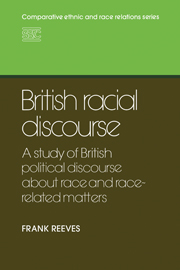Book contents
- Frontmatter
- Contents
- List of figures and tables
- Acknowledgments
- Objectivity
- Introduction
- 1 The meaning of ‘racism’: its limitations when applied to the study of discourse dealing with race relations
- 2 The meaning of ‘ideology’ and its relationship to discourse
- 3 The economic foundations of racial division
- 4 The state, levels of political articulation, and the discourse of the Conservative and Labour Parties
- 5 British political values and race relations
- 6 The nature of discoursive deracialisation
- 7 Deracialised justifications: a case study (an analysis of the parliamentary debates on immigration)
- 8 Conclusion: ideology and British race relations
- Appendix 1 Nomenclature
- Appendix 2 Ideological eristic
- Appendix 3 Examples from colonial history of discoursive deracialisation
- Appendix 4 Further examples of popular sanitary coding
- Bibliography and references
- Name index
- Subject index
Appendix 4 - Further examples of popular sanitary coding
Published online by Cambridge University Press: 05 November 2011
- Frontmatter
- Contents
- List of figures and tables
- Acknowledgments
- Objectivity
- Introduction
- 1 The meaning of ‘racism’: its limitations when applied to the study of discourse dealing with race relations
- 2 The meaning of ‘ideology’ and its relationship to discourse
- 3 The economic foundations of racial division
- 4 The state, levels of political articulation, and the discourse of the Conservative and Labour Parties
- 5 British political values and race relations
- 6 The nature of discoursive deracialisation
- 7 Deracialised justifications: a case study (an analysis of the parliamentary debates on immigration)
- 8 Conclusion: ideology and British race relations
- Appendix 1 Nomenclature
- Appendix 2 Ideological eristic
- Appendix 3 Examples from colonial history of discoursive deracialisation
- Appendix 4 Further examples of popular sanitary coding
- Bibliography and references
- Name index
- Subject index
Summary
By the late 1970s the number of black people who had lived in Britain for over a quarter of a century and the children that had been born to them here was beginning to make the term ‘immigrant’ appear inappropriate. A new term for the black population had to be found. It was supplied by social scientists who had rejected the biological connotations of the term ‘race’ in favour of what they regarded as the more scientifically accurate and culturally orientated expression, ‘ethnic minority group’. In this way, Greeks, Italians, Indians, Pakistanis, and Jamaicans could all be distinguished and classified as ethnic minorities living among the British (or, rather, the English, Welsh, and Scottish?) ethnic majority. But, because the largest and most visible ethnic minority groups were black, and most attention was paid to them, ‘ethnic minority’ began to take on that specific connotation. Soon the term ‘minority’ could be dropped and ‘ethnic’ left to mean black – Asian and Afro-Caribbean.
Nowhere was this better contextually illustrated than in the draft of the 1979 Local Government Grants (Ethnic Groups) Act which, before it fell as a result of the 1979 General Election, was to have replaced Section 11 of the Local Government Act. The explanatory memorandum stated that the Bill's purpose was to enable grants to be paid to local authorities towards expenditure incurred by them in helping to remove disadvantages suffered by ‘ethnic groups’ living in their areas, of providing equally effective services for them, ‘and of promoting good relations between ethnic groups or between ethnic groups and the rest of the community’.
- Type
- Chapter
- Information
- British Racial DiscourseA Study of British Political Discourse About Race and Race-related Matters, pp. 265 - 267Publisher: Cambridge University PressPrint publication year: 1983



